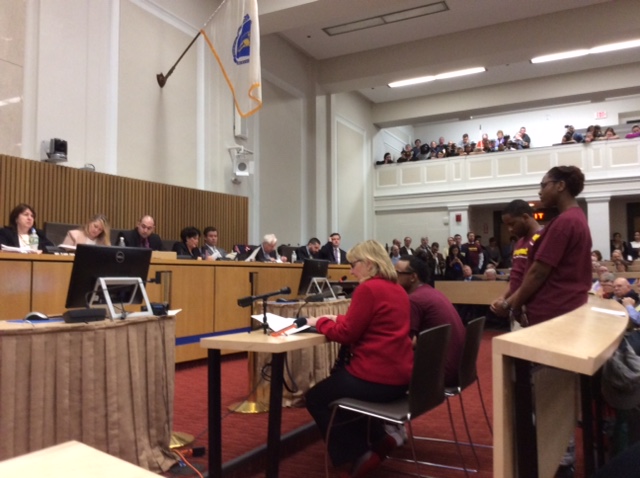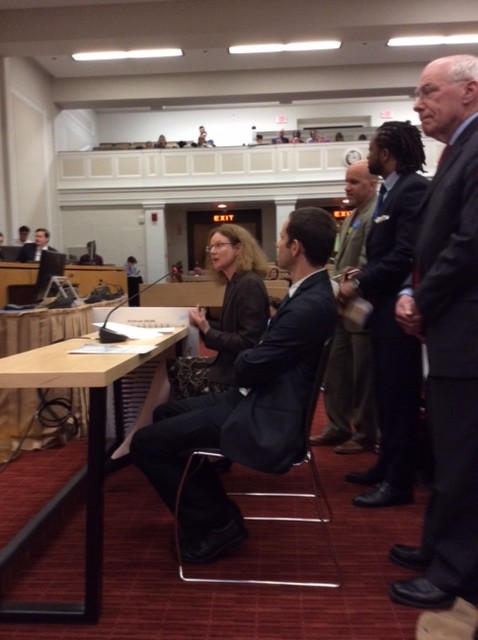Massachusetts Sen. Karen E. Spilka (Left) with members of Teens Leading the Way testify on juvenile justice issues on June 5th, before the Joint Committee on the Judiciary.
Much has been written about the important campaign to raise the age of juvenile court jurisdiction to include 18-, 19-, and 20-year-olds. There are four bills filed by Massachusetts legislators for consideration this session that advocate for this path, easing the state into recognizing a group now called “emerging adults” as worthy of particular attention. One bill, launched by Citizens for Juvenile Justice (CFJJ), Roca, Inc., and United for Teen Equality Center (UTEC), is backed by more than forty organizations: the Juvenile Justice Omnibus Bill (S.947/H.3079). Sen. Karen E Spilka and Rep. Kay Khan are lead sponsors on this. Rep. Evandro Carvalho has filed his own bill to raise the age, H.3037, “An Act to promote better outcomes for young people in the Commonwealth.” Sen. Cynthia Creem is advocating for expanding juvenile court jurisdiction in her bill, S.816.. On June 5th, the Joint Committee on the Judiciary held a public hearing on the bills.
Raising the age makes sense say many experts. Vincent Schiraldi, Senior Research Fellow at the Harvard Kennedy School, in a recent Boston Herald article said, “Many of the important bridges that criminologists believe young people need to cross before they age out of adolescent crime — like completing their education and getting a job — come later for today’s generation of young people and are negatively affected by an adult-level conviction. This is especially true for young African-Americans and Latinos who are incarcerated in Massachusetts at 3.2 and 1.7 times the rate of whites, respectively.”
Lael Chester, also a Research Fellow at the Harvard Kennedy School, testified with Rep. Carvahlo at the June 5th hearing at the State House. She cited brain development which is not complete until the mid-20s or later, and pointed out that research shows how “emerging adults” are developmentally similar to their 16- and 17-year-old peers: impulsive, susceptible to the influence of friends, and risk-takers.
The State House News as reported in the Worcester Telegram & Gazette quoted Chester from a May briefing at the State House as saying “Emerging adults drive a disproportionately large share of the criminal justice system, making up 10 percent of the Massachusetts population but 29 percent of arrests and 23 percent of the state’s incarcerated population.” Chester said “They also have the highest recidivism rates among all age groups: 76 percent of 18- to 24-year-olds released from jail or prison in 2011 were re-arraigned within three years.”
Those who argue in favor of raising the ageof juvenile court jurisdiction also say an overly punitive approach isn’t working and that most young people age out of crime. Research has shown this time and time again.
Lael Chester testifying before the Joint Committee on the Judiciary on June 5th, 2017.
One aspect of the campaign that is not getting enough attention, in my opinion, is why it is so crucial to exclude young children from our court system. As I wrote for Truthout more than two years ago in 2015, “Children as young as 6 can go to court in North Carolina, while four states – Massachusetts, New York, Connecticut and Rhode Island – set the youngest age at 7. Thirty-three states set no age for court involvement, but according to the National Center for Juvenile Justice, that means age 7 is the default, or ‘the youngest age under common law where a child would be considered capable of criminal intent.'”
At the June 5th hearing, retired Juvenile Court Justice Leslie Harris said it most eloquently when he spoke: “I am concerned that we have children in the system who cannot spell the word ‘criminal’ because they are too young.”
Several of the Massachusetts bills (H.3037, H.3078, S.947) would exclude children under 12 from appearing in a courtroom. The actual age number for a child to be considered culpable seems somewhat arbitrary, even among experts. According to Citizens for Juvenile Justice, a 2003 study found that “children ages 11 to 13 demonstrated significantly poorer understanding of trial matters, as well as poorer reasoning and recognition of the relevance of information for a legal defense than did a 14- and 15-year-olds.”
I interviewed Mariame Kaba, the founding director of Project NIA in Chicago, which aims to end youth incarceration, for my Truthout article. She said, “At a certain point, age is irrelevant. We don’t treat children who are Black as children.” The American Psychological Association underscored this issue with its 2014 report that Black boys as young as 10 are more likely than their White peers “to be mistaken as older, perceived as guilty, and face police violence if accused of a crime.”
Arresting kids will never get to the bottom of the problem.”Kids are in conflict with the law because of unmet needs,” wrote Kaba and Dominican University professor Michelle VanNatta in a 2013 report on the state of youth justice. From their findings: Kids who act out may be facing overcrowded school classrooms or have crises in their families; there may be a lack of recreational and after-school activities available; students may be homeless; school resource officers and police patrol schools, often threatening, rather than protecting children.
Some states are beginning to agree that the lower age of juvenile court involvement must be raised as well. In California, there is a presumption that a child under age 14 lacks the understanding of “wrongfulness” and the state “needs clear proof” to rebut that presumption. In Ohio, the courts rarely find competence for a child under age 14, and in the past 30 years in Florida, no child under age 12 has been processed in juvenile court.
Keeping kids out of the justice system is a worthy goal, and experts agree that community based interventions are far more effective and successful in holding a young child accountable for their actions.
We need more justice through education and not through punishment, and this particularly applies to our children.


